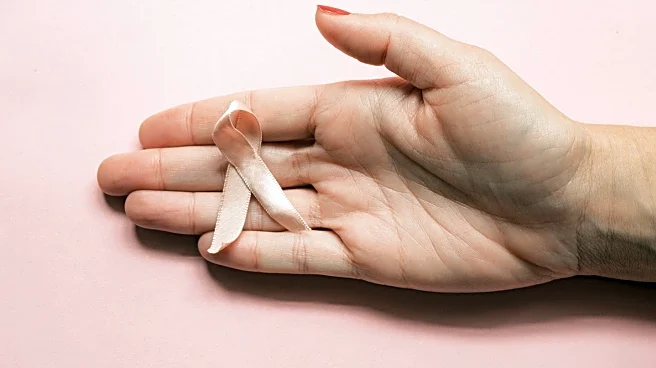What's Happening?
Breast implant removal surgery, also known as explant surgery, is becoming increasingly popular among women in the United States. This trend is driven by a combination of health concerns and changing personal preferences. Notable figures such as Pamela Anderson and Chrissy Teigen have publicly shared their decisions to remove implants, highlighting a shift in societal attitudes. The surgery involves removing breast implants and, in some cases, the surrounding scar tissue. Health concerns, including links to a rare type of lymphoma and symptoms associated with Breast Implant Illness (BII), have contributed to the rise in explant procedures. BII is characterized by symptoms like fatigue, brain fog, and joint pain, although it is not yet officially recognized as a medical diagnosis. Despite the increase in explant surgeries, they still represent a small percentage of total cosmetic procedures.
Why It's Important?
The growing trend of breast implant removal reflects broader societal changes in beauty standards and health awareness. As more women prioritize health and personal comfort over aesthetic enhancements, the cosmetic surgery industry may see shifts in demand. This trend could lead to increased scrutiny of implant safety and more research into conditions like BII. The rise in explant surgeries also highlights the importance of patient autonomy and informed decision-making in medical procedures. Women are increasingly seeking to reclaim control over their bodies, challenging cultural and industry pressures to conform to certain beauty ideals. This movement may influence future regulations and safety standards in the cosmetic surgery field.
What's Next?
As awareness of the potential health risks associated with breast implants grows, it is likely that more women will consider explant surgery. The medical community may respond with further research into BII and other implant-related health issues. Regulatory bodies like the FDA could implement stricter safety guidelines for breast implants. Additionally, the cosmetic surgery industry may need to adapt to changing consumer preferences, potentially leading to innovations in alternative procedures that prioritize health and safety. Public discussions and support groups may continue to play a crucial role in empowering women to make informed choices about their bodies.
Beyond the Headlines
The rise in explant surgeries raises ethical questions about the role of medical professionals in guiding patient decisions. Reports of surgeons discouraging explant procedures in favor of maintaining implants suggest a need for greater transparency and patient advocacy. The trend also reflects a cultural shift towards body positivity and acceptance, challenging traditional beauty norms. As more women share their experiences online, social media platforms may become key spaces for information exchange and support, though they also pose risks of misinformation. The long-term impact of this movement could lead to a reevaluation of beauty standards and a more holistic approach to health and wellness.








